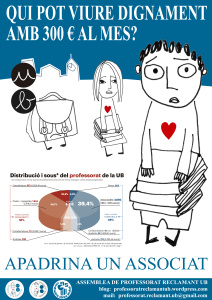Accueil > Statuts et précarité > Précaires > Precarious lives. Some notes from the fight against the commodification of (...)
 Precarious lives. Some notes from the fight against the commodification of education at the University of Barcelona - Γιακουμής ο Ράφτης, 3533, 5 août 2014
Precarious lives. Some notes from the fight against the commodification of education at the University of Barcelona - Γιακουμής ο Ράφτης, 3533, 5 août 2014
vendredi 3 avril 2015, par
En Espagne, comme dans les pays du Sud de l’Europe où les "ajustements structurels" sont à l’ordre du jour, on appelle un chat un chat et l’exploitation se dit "exploitation".
Quand l’éducation est devenue une marchandise, comment cela se traduit-il en pratique ? Et quel rôle y jouons-nous ?
Analyse décapante en léger différé de Barcelone.
![]() Lire sur le blog
Lire sur le blog
Does the University of Barcelona exploit its workers ? This was the question posed by many big-sized protest signs which appeared two months ago at the Faculty of History, Geography and Philosophy. The week after, several short biographies stuck to the walls of corridors and halls of the Faculty building, located in the gentrified northern part of the Raval neighbourhood, offered an answer to the question.
My name is Keka, and I am 30 years old. I have a PhD and I work as an adjunct lecturer. I teach 2 full courses, which is half of the teaching duty of a regular professor. This means working at least 20 hours per week. I earn the miserable salary of 340 euros per month, which barely allows me to pay my room in a shared flat. Apart from the fact that my contract miscalculates the necessary time for preparing the courses, I just do not get paid for my research. In order to eat, I have to borrow money from my parents. They also give me tupperwares with leftovers when I visit them on Sundays. Every September, I don’t know until the last minute whether my contract will be renewed or not. Unless things change radically, I have no chance whatsoever to get a well-paid full-time position.
The name is invented, but the story is real. Just another one among the precarious lives that make up the campaign “Be a godparent to an adjunct lecturer”, which uses irony in order to denounce and make visible both the extreme exploitation suffered by adjunct lecturers and its personal and psychological consequences. For only 1 euro you can get a nice badge picturing the adjunct lecturer of your preference and a leaflet with his or her life story.

During the last years, the number of adjunt lecturers has rocketed in all Spanish public universities, and we now amount up to 40% (around 2.000) of the total faculty at the University of Barcelona. Adjunct lecturers are supposed to be well-respected professionals who have a career outside the academic world and enrich it with their professional expertise. In practice this is completely false. Adjunct lecturers are young –and not so young- researchers that are at the beginning of their academic career. We are just cheap labor that universities can hire or dismiss at will, since we sign contracts of six months or one-year duration. When they fire us, we just get “not renewed”.
There is a word for describing this situation, and this word is exploitation. Karl Marx analyzed it very lucidly. At the end of the day, it can be reduced to the fact that the worker doesn’t get fully paid for the value she or he is producing. In the case of the University of Barcelona we are in front of extreme exploitation. The University of Barcelona claims “excellence” in research as its main asset, and is proud of being in outstanding positions in international rankings. Leaving aside the question of the way these rankings are produced and the question of the mass-production of academic junk, note that this “excellence” is based not on cheap labor, but on free labor by adjunt lecturers.
The exploitation of adjunct lecturers is but another symptom of the global trend towards the commodification of university education. Labor relations are just one piece of the puzzle. The other pieces include huge increases in tuition fees (more than 70% in three years) which are already ousting poor students from the university system (or compelling them to get trapped in debt), a gradual takeover by corporations’ interests that reorient many subject matters and influence policy, reforms in the governance system, salary cuts for civic servants, etc., all aimed at reducing the size of public universities and leave space for private ones. University doesn’t escape the wave of dispossession that the structural transformation of capitalist states in a neoliberal way entails, which is nowadays especially felt in debtocratic Southern Europe, despite being, of course, a wider phenomenon.
Students are usually the most rebelliously creative part of the fight against neoliberalism in the university, as it has most recently been the case in Quebec or Chile, or in the 2009 protests against the implementation of the European Space for Higher Education in Barcelona. But professors play a role too. And, step by step, some of us, who think the time has come to say no to this theft, are slowly starting to organize against this situation in our corner of the planet.

The Assemblea de Professorat Reclamant (http://professoratreclamantub.wordpress.com/ ; we can be reached at : professorat.reclamant.ub@gmail.com) has organized several protests, issued many analyses and communiqués, given interviews to the press, launched the abovementioned visibilization campaign, and registered several formal complaints. The goal of these formal complaints -fostered by the labor union Coordinadora Obrera Sindical (http://cosub.wordpress.com/)-, which was to open a political negotiation by threatening to put a law suit to the University of Barcelona on the basis of the blatant illegality of our contracts –since our fixed term contracts are systematically used to meet permanent teaching needs-, has not been attained yet, but the formal complaint has been a very useful tool for gathering the approximately 85 adjunct lecturers that have signed it in an assembly.
One could think that 85 out of 2.000 is not that much, and consider our fight as a complete failure. But we prefer to ask ourselves why is it so difficult to mobilize our fellow adjunct lecturers in support of what we conceive as basic demands : bread, future, education for all. And this question amounts to asking ourselves the more meaningful and disturbing question of why do we collectively consent to this situation. The answer that we have found so far listening to our colleagues –and ourselves- is many-sided, and has to do with the fear of losing the job, the need of this meagre income to survive, the lack of time for organizing due to the franctic rythm of having multiple jobs, the feudal dependence on some full-time professor for contract renewal, the blind faith that things will somehow change regardless of the evident privatization trends… and, last but not least, the assumption of and participation in elite values.
Regardless of the small dose of social criticism that can still be found within its walls, university is a key institution in the reproduction of social relations, and university professors are thus key organic intellectuals in the Gramscian sense. According to Antonio Gramsci, for an elite to maintain social control over subaltern classes, brute force alone is not enough. The symbolic struggle around the construction of cultural hegemony through the production and reproduction of an ideological consensus is crucial as well. This battle is subtly fought by a network of institutions, associations, educational systems, and intellectuals, which Gramsci calls “civil society”.
Of course things have changed a lot since the 1920s, and a world of difference lies between today’s mass media and intellectual precariat and those days’ Intellectuals in capital letters, such as right-wing historian and philosopher Benedetto Croce. But class domination still rests on discourses and practices which are also produced and reproduced in universities. Think of the economists that naturalize inequality with their theories and models, the urban planners that shape cities from above according to private interests, or the historians that write narratives of the past from the victor’s point of view.
Thus, in many cases, we adjunct lecturers are paradoxically the –often unconscious- vehicles of reproduction of discourses used to consolidate the same social inequality that is responsible for our precarious lives. This has been a source of contradictions for some of us. The wish to transform university from an institution that tacitly teaches submission into a collective tool in the service of social justice –which is clearly not possible overnight- clashes with the urgent need to defend it as a public institution against the increasing appropriation of it by corporate interests. In a context in which capitalism is de-statalizing and privatizing many public institutions, some of us think that the first trench is to defend them and their workers so that they can be accessible for all.
But this should not prevent us from clearly pointing to the root of the problem and trying to spread the wish of a profound change, the wish for an other university. In fact, one of the successes of the Assemblea de Professorat Reclamant has been to start shifting the protest from a corporativist discourse towards a political one, calling things by their name, talking about exploitation, and understanding our fight as a part of a wider fight for social justice. The path is long, no doubt, and in universities longer and full of obstacles. But it always starts with the first steps, which some of us are trying to walk with a direction in our minds, ears and feet : below and to the left.
Voir aussi cet article sur le site d’El Pais


